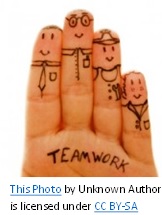Teams typically go through four stages od team development. The reason to have people work as a team is to transfer decision making power to the team members. In doing so the team will become autonomous towards realizing a mission, goal or project. Some teams are ongoing and others may be formed for a specific project or to solve a problem.
We have a unique definition of these stages in our leadership and team development training programs.
1. Dependency
At this stage a new team has been formed and team members are going through an adjustment period to find their place. Members start to feel each other out and get to know one another.
At this stage team members are dependant on their supervisor/manager for decisions. The group or team is without power. To move to the next stage, they need to establish ground rules for working together to make decisions.
2. Conflict
As team members begin to discuss ground rules and how to organize themselves, conflict tend to arise as people assert their viewpoints. This is normal and to be expected. Team members need to learn how to work through these conflicts. The supervisor/manager must help them at this stage.
3. Cohesion
As team members effectively work through their differences, they start to form an identify and become sensitive to the needs of others. They become capable of taking on greater responsibility for tasks and decision making.
4. Interdependence
Team members have now reached a higher level of teamwork and team spirit. They can engage in creative problem solving for continuous improvement and innovation. They become fully autonomous and can take on higher level decision making.
Process
Although it sounds straight forward and simple there are many challenges in going through these team development stages effectively. If teams cannot deal with and overcome the conflicts that often arise, they may never progress beyond the first stage.
 It is imperative that the leader understands these stages of team development and the role of the leader and team members to ensure that they can work through each stage successfully.
It is imperative that the leader understands these stages of team development and the role of the leader and team members to ensure that they can work through each stage successfully.
In upcoming articles and videos, I will go into more depth on these stages and what to do to navigate through them.
